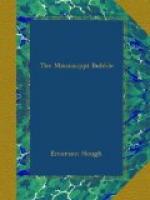“Have done thy jests, Wilson,” cried Pembroke. “Mayhap there is somewhat to be learned here of this New World and of our dear cousins, the French. Go on, tell us, Monsieur du Mesne—as I think you call yourself, sir?—tell us more of your new country of ice and snow, of princesses and little shoes.”
The original speaker went a bit sullen, what with his wine and the jests of his companions. “I’ll tell ye naught,” said he. “Go see for yourselves, by leave of Louis.”
“Come now,” said Pembroke, conciliatingly. “We’ll all admit our ignorance. ’Tis little we know of our own province of Virginia, save that Virginia is a land of poverty and tobacco. Wealth—faith, if ye have wealth in your end of the continent, ’tis time we English fought ye for it.”
“Methinks you English are having enough to do here close at home,” sneered Du Mesne. “I have heard somewhat of Steinkirk, and how ye ran from the half-dressed gentlemen of France.”
Dark looks followed this bold speech, which cut but too closely to the quick of English pride. Pembroke quelled the incipient outcry with calmer speech.
“Peace, friends,” said he. “’Tis not arms we argue here, after all. We are but students at the feet of Monsieur du Mesne, who hath returned from foreign parts. Prithee, sir, tell us more.”
“Tell ye more—and if I did, would ye believe it? What if I tell ye of great rivers far to the west of the Ottawa; of races as strange to my princess’s people as we are to them; of streams whose sands run in gold, where diamonds and sapphires are to be picked up as ye like? If I told ye, would ye believe?”
The martial hearts and adventurous souls of the circle about him began to show in the heightened color and closer crowding of the young men to the table. Silence fell upon the group.
“Ye know nothing, in this old rotten world, of what there is yet to be found in America,” cried Du Mesne. “For myself, I have been no farther than the great falls of the Ontoneagrea—a mere trifle of a cataract, gentlemen, into which ye might pitch your tallest English cathedral and sink it beyond its pinnacle with ease. Yet I have spoke with the holy fathers who have journeyed far to the westward, even to the vast Messasebe, which is well known to run into the China sea upon some far-off coast not yet well charted. I have also read the story of Sagean, who was far to the west of that mighty river. Did not the latter see and pursue and kill in fair fight the giant unicorn, fabled of Scripture? Is not that animal known to be a creature of the East, and may we not, therefore, be advised that this new country takes hold upon the storied lands of the East? Why, this holy friar with whom I spoke, fresh back from his voyaging to the cold upper ways of the Northern tribes, who live beyond the far-off channel at Michilimackinac—did he not tell of a river of the name of the Blue Earth, and did he not himself see turquoises and diamonds




